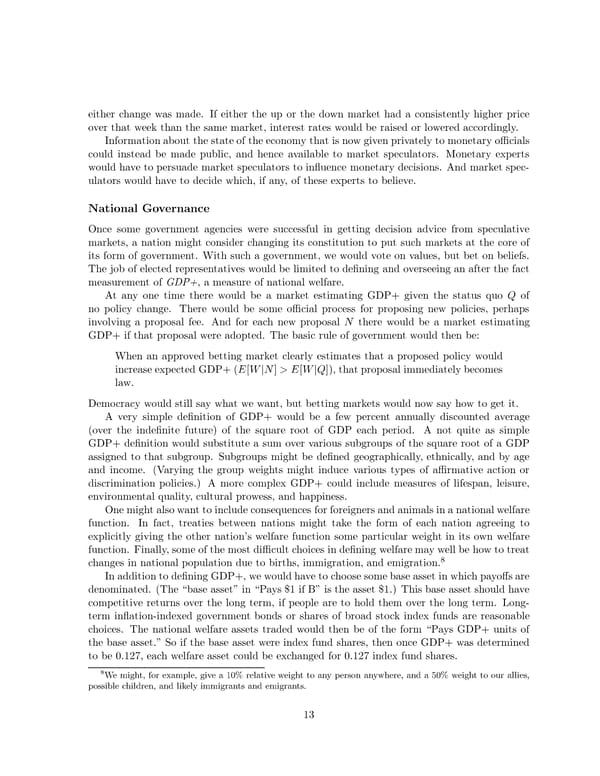either change was made. If either the up or the down market had a consistently higher price over that week than the same market, interest rates would be raised or lowered accordingly. Information about the state of the economy that is now given privately to monetary officials could instead be made public, and hence available to market speculators. Monetary experts would have to persuade market speculators to influence monetary decisions. And market spec- ulators would have to decide which, if any, of these experts to believe. National Governance Once some government agencies were successful in getting decision advice from speculative markets, a nation might consider changing its constitution to put such markets at the core of its form of government. With such a government, we would vote on values, but bet on beliefs. The job of elected representatives would be limited to defining and overseeing an after the fact measurement of GDP+, a measure of national welfare. At any one time there would be a market estimating GDP+ given the status quo Q of no policy change. There would be some official process for proposing new policies, perhaps involving a proposal fee. And for each new proposal N there would be a market estimating GDP+ifthat proposal were adopted. The basic rule of government would then be: When an approved betting market clearly estimates that a proposed policy would increase expected GDP+ (E[W|N]> E[W|Q]),thatproposal immediatelybecomes law. Democracy would still say what we want, but betting markets would now say how to get it. A very simple definition of GDP+ would be a few percent annually discounted average (over the indefinite future) of the square root of GDP each period. A not quite as simple GDP+definition would substitute a sum over various subgroups of the square root of a GDP assigned to that subgroup. Subgroups might be defined geographically, ethnically, and by age and income. (Varying the group weights might induce various types of affirmative action or discrimination policies.) A more complex GDP+ could include measures of lifespan, leisure, environmental quality, cultural prowess, and happiness. Onemightalsowanttoincludeconsequences forforeignersand animalsina nationalwelfare function. In fact, treaties between nations might take the form of each nation agreeing to explicitly giving the other nation’s welfare function some particular weight in its own welfare function. Finally, some of the most difficult choices in defining welfare may well be how to treat changes in national population due to births, immigration, and emigration.8 In addition to defining GDP+, we would have to choose some base asset in which payoffsare denominated. (The “base asset” in “Pays $1 if B” is the asset $1.) This base asset should have competitive returns over the long term, if people are to hold them over the long term. Long- term inflation-indexed government bonds or shares of broad stock index funds are reasonable choices. The national welfare assets traded would then be of the form “Pays GDP+ units of the base asset.” So if the base asset were index fund shares, then once GDP+ was determined to be 0.127, each welfare asset could be exchanged for 0.127 index fund shares. 8We might, for example, give a 10% relative weight to any person anywhere, and a 50% weight to our allies, possible children, and likely immigrants and emigrants. 13
 Shall We Vote on Values, But Bet on Beliefs? Page 14 Page 16
Shall We Vote on Values, But Bet on Beliefs? Page 14 Page 16